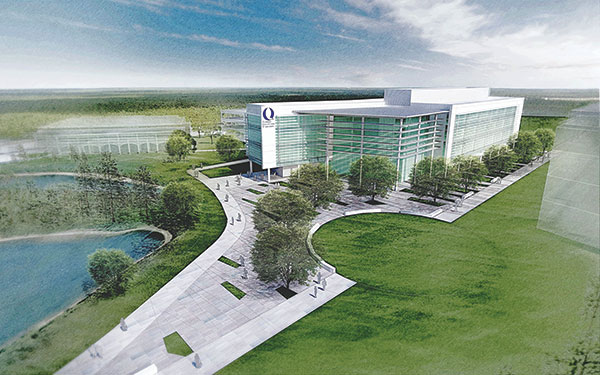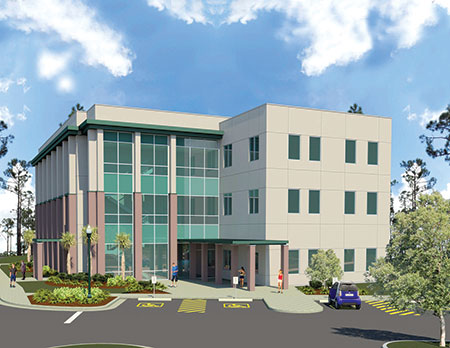EVEN THE 2020 HEALTH pandemic couldn’t shut down progress at Florida Gulf Coast University.
Construction on two academic buildings to house FGCU’s two newest schools has started and is progressing nicely. Tom Mayo, director of facilities planning, said “both projects are tracking on schedule, and we do not foresee a delay.”
That means Lucas Hall, future home of the Frank and Ellen Daveler & Sandra Kauanui School of Entrepreneurship, should open for classes in August 2021. Meanwhile, the Integrated Watershed and Coastal Studies facility – known as Academic Building 9 – is scheduled to debut in January 2022 as home of The Water School.

First project up will be the $9.75 million Lucas Hall, a three-story, 27,000-square-foot structure that will house a program rated by The Princeton Review as Florida’s top school for undergraduate entrepreneurship studies. The hall – named for one of FGCU’s top benefactors, prominent developer David Lucas, who served on the inaugural Board of Trustees and the FGCU Foundation Board of Directors – will include a Student Incubator, Maker Space, classrooms and offices. Besides the school, it will also house the Institute for Entrepreneurship, Small Business Development Center and the Regional Economic Research Institute.
“The school is focused on student success, and being a catalyst to grow the entrepreneurial economy in Southwest Florida through creating an entrepreneurial mindset throughout the university,” said Sandra Kauanui, director of the School of Entrepreneurship, professor, and one of the school’s honored namesakes.
The growth of the entrepreneurship school the past two years is the main impetus behind the push to give the program its own building, FGCU President Mike Martin said.
“The other is it’s a chance for us to really highlight one of the most rapidly growing and impactful programs we have on campus,” he said.
Another program fitting that description is The Water School, which Martin described as an “anchor and a significant part of who we are and continue to become.”
“There’s no more profound set of issues facing the future of this region than what we do on water,” Martin said. “Therefore, a regional university ought to make sure it’s a player in that.”
Unlike Lucas Hall, which did not have a ceremonial groundbreaking due to the health crisis, the 117,000-square-foot, $58-million AB9’s symbolic shovel-turning attracted more than 200 people in November 2019.
 “Everything that we do in art and music and hydrology and engineering and other (disciplines) involves water, so it cuts across the entire university and engages us all,” Martin said.
“Everything that we do in art and music and hydrology and engineering and other (disciplines) involves water, so it cuts across the entire university and engages us all,” Martin said.
In addition to 58,600 square feet of research lab space, the four-story structure will provide classrooms (23,400 square feet) and teaching labs (15,000 square feet) and will bring most of The Water School’s core faculty under one roof.
“This building is an exciting new resource for the university,” said Greg Tolley, executive director of The Water School and professor of marine science. “We want it to be a public space. There will be meeting rooms where we can invite people from local communities to come in and talk about issues of importance. We want people to think of this as being Southwest Florida’s building as well.”
Sponsorship opportunities are available for both buildings, including the naming rights for AB9. To learn how to become involved in these two innovative projects, contact Bill Rice, senior associate vice president for University Advancement, at (239) 590-1077 or [email protected].